#booknotes
Text

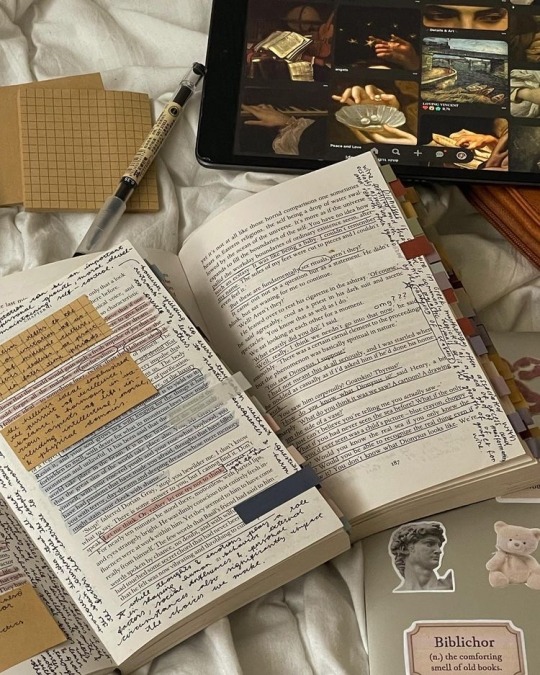




The art of annotations | @pagesofjasmine
via: Pinterest
#aesthetic#chaotic academia#classic academia#dark academia#dark academia aesthetic#university#classic literature#books and libraries#books and coffee#books and literature#book annotations#bookish#booklover#annotations#writer#writing#booknotes#notes#annotated books#annotated bibliography#light acadamia aesthetic#study aesthetic#Bookstagram#book aesthetic#book and reading#analysis#book analysis#bookaddict#bookaholic
266 notes
·
View notes
Text

<<< Notizen vom Vorbesitzer (m)eines Buches! <3
-Kafka aus dem Bücherantiquariat <3
#bücherantiquariat#second hand books#Literatur#deutsche literatur#Kafka#Franz Kafka#booknotes#Books and wine#well read#readers of tumblr#eigenes#plottwistedstory#vintagebook#old books#old art#Poesie
13 notes
·
View notes
Text
Book Notes: The Long Way to a Small, Angry Planet

This winter ended up being a season of cozy science fiction for me. I devoured Winter's Orbit by Everina Maxwell (amazing) and then plowed through every book in Becky Chambers' Wayfarers series. Those of you who regularly read our blog will remember Lori raving about Becky's Monk and Robot series (also amazing and cozy and full of self-acceptance and love). Well, it prompted me to get the audio-book of The Long Way to a Small, Angry Planet, #1 in Wayfarers. Her world-building, wit, and characters are all *chef's kiss*. Of all of the probable and improbable sci-fi futures I've read, this is the one I like the most. Full of acceptance and a mingling of cultures and diverse beings who learn about each other's ways of life, it is so very satisfying to read.
Book 1 follows the motley crew of The Wayfarer, a ship tasked with making tunnels to connect one faraway place with another. When the crew (several humans from wildly different backgrounds, a reptilian Aandarisk pilot, a member of a mostly extinct species, a navigator shrouded in secrecy, and an AI) takes on a lucrative long-haul job, they're stuck together on their small vessel for almost two years. Along the way they encounter pirates, a xenophobic border control, sabotage, and more, only to reach their destination and end up in the crosshairs of a local conflict. It’s not all bad, though. They are also reunited with loved ones, make plenty of new friends, and grow closer as a crew (although begrudgingly for some of them).
The later books don't have to be read in any specific order; they're more companion novels than a series, with occasional references to characters from The Long Way to a Small, Angry Planet, so definitely read that first. This series is an absolute joy to read. A little bit of romance, a smattering of found family, and a whole lot of space, these slower-paced books are a warm hug, or a cozy blanket on a rainy day. They are my new favorite comfort reads, and if you love a diverse cast of characters and enjoy books about the intricacies of people and their relationships with one another, then they might be yours too!
— Becca
#island books#becca oman#long way to a small angry planet#becky chambers#science fiction#space opera#cozy#sci fi#booknotes
28 notes
·
View notes
Text
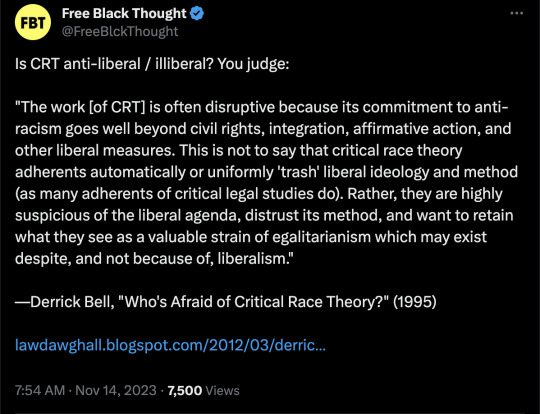
https://lawdawghall.blogspot.com/2012/03/derrick-bell-whos-afraid-of-critical.html
Critical race theory writing and lecturing is characterized by frequent use of the first person, storytelling, narrative, allegory, interdisciplinary treatment of law, and the unapologetic use of creativity. The work is often disruptive because its commitment to anti-racism goes well beyond civil rights, integration, affirmative action, and other liberal measures. This is not to say that critical race theory adherents automatically or uniformly “trash” liberal ideology and method (as many adherents of critical legal studies do). Rather, they are highly suspicious of the liberal agenda, distrust its method, and want to retain what they see as a valuable strain of egalitarianism which may exist despite, and not because of, liberalism.
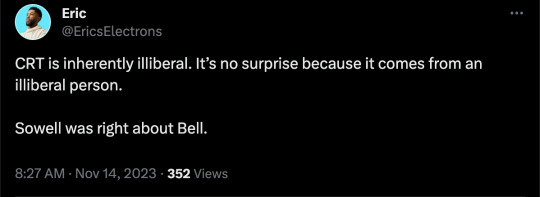
C-SPAN Booknotes: Thomas Sowell (1990)
Brian Lamb: What's the state of prejudice in the United States today compared to earlier years in your life?
Thomas Sowell: It depends on the base here, like most comparisons. If you take 30 years ago, certainly greater in the academic world. In the book that I wrote about colleges, I urged minority parents not to think that because they had a good experience on a particular college campus 30 years ago, that their children will have that good an experience today, because the racial tension is enormous on many campuses. The colleges themselves try to say that they're victims of the racism of the larger society, and in point of fact, the racism on the campuses is greater than that in the larger society, in many campuses. And what I worry about is that they're going to graduate into the general society, blacks and whites alike, who hate each other's guts, and who can be the leaders of new racial strife for the future.
Lamb: What's causing that on college campuses?
Sowell: One of the factors is the preferential policies. But it's more the just that, because that in itself sets in motion a series of events, which add to the original resentment over the preferential policies. That is, you put yourself in the position of a black kid who comes out of the ghetto school, and he's gone through for 12 years with nothing but A's and B's, without a great deal of effort, and now he finds himself for the first time in his life in a predominantly white environment, and he finds that when he works twice as hard as he's ever worked, all he gets back for his work is a D, and that there is also a minority establishment -- this is true not only of blacks but of minorities in general -- an establishment which tells him, "Yes, this is the racism on this campus -- the white power structure is trying to keep you down." And it has to have a certain plausibility to it. It would have a certain plausibility to me had I come along in that era.
Now, I was fortunate enough in one sense that, having grown up in the south and then transferred to New York, I was shifted between different levels of education, and so I was a top student in my class in North Carolina, and then I was immediately the bottom student in my class in Harlem, and I was way behind whoever was next to the bottom, because the educational differences were just that great. A very painful period of adjustment, but there was no racial issue involved, since all the other kids ahead of me were all black. And so I got through that, and then for a second time in my life, I had gone out on my own when I was 17, and I didn't return to college full-time until I was about 25. For the second time in my life, I went into an environment that was very difficult compared to what I'd been used to, and once again I was way behind and I was in danger of flunking out of school the first semester.
Lamb: Where were you then?
Sowell: Harvard. Really, it really is incredible -- for the first time in your life, in ten years, you're a full-time student, and you're a full-time student at Harvard, without a high school diploma. So there were little difficulties.
Lamb: And studying what?
Sowell: Oh, at that stage I was studying just general things, but I majored in economics, and all my degrees are in economics. Again I had an enormous adjustment to make, but there was no one there to tell me, "All these white professors have it in for you and that's why you're doing badly." Because first of all, I had done badly in Harlem, and I'd overcome, and I was doing badly there and I overcame it, but ...
Lamb: What happened -- take that Harvard experience through. How long did you stay at Harvard?
Sowell: Oh, I graduated.
Lamb: Graduated from Harvard.
Sowell: From Harvard.
Lamb: I'm sorry, I thought you said earlier you went to Howard.
Sowell: I went there for a year and a half, and then I transferred to Harvard.
Lamb: Oh, okay.
Sowell: You see, but I was going to Howard in the evening while working full-time during the day so when I went to Harvard I was a full-time student for the first time in ten years, and so that was a...
Lamb: And what years did you go to Harvard?
Sowell: I graduated in class of '58 -- so that you can understand how the student would find this plausible. I talked to a black man recently, a lawyer, who said when he was in law school, he was told when he first got there, that Professor X never gives black students more than a C, you know, and he got a B+, but there was great consternation because one of the myths had fallen. But, it's truly criminal what goes on in terms of using and manipulating the students to serve all kinds of external purposes.
Lamb: Can you give us an idea of the kind of external purposes you're talking about?
Sowell: Oh, political purposes. I just a couple of days ago was told by someone from Wellesley that there's a divestment campaign at Wellesley, demonstrations, the whole thing, and that those black girls who did not want to participate in that were threatened with violence -- and that's not unique.
At Stanford the Hispanic students, some Hispanic students, have complained that the Hispanic establishment has threatened them if they don't want to go along with what's being said and done, and they claim that only 15% of the Hispanic students at Stanford have ever attended a single event spons.ored by the Hispanic establishment, which speaks boldly in their name. Ah, and so you have this kind of thing going on at these schools across the country.
Again, notice, that once, once you let in the students who cannot make, meet the academic standards, you're going to end up having to let in professors who can't meet the academic standards. You're going to have to create courses that don't meet the academic standards.
Lamb: Correct me on the, on the names and everything. Derrick Bell?
Sowell: Yes.
Lamb: Harvard Law School, black man.
Sowell: Yes.
Lamb: Threatened the law school if they didn't hire a black woman, he's going, he's leaving?
Sowell: Well, if I understand it correctly, he's taking unpaid leave until such time as they hire a woman of color, as he says.
Well, he's also said that by black, he does not mean skin color, he means those who are really black, not those who think white and look black. And so what he is really saying is he wants ideological conformity in the people that are hired to fill this position. That's not uncommon either.
I know a black woman, for example, who had a Ph.D. -- she's had a book published, she has another contract on another book, she's taught at a couple of very nice places, she has a devil of a time getting a job -- not a job in a prestigious institution, a job teaching at a college. And the reason is that she gets shot down, blackballed, whatever, by people who don't like her ideology.
That's happening not only racially, it's also happening where race is not an issue. In a law school, I learned recently, there's a woman who was being considered for a tenured position, and all the men voted for her and all the woman voted against her, because she does not follow radical feminism.
And so you're getting these ideological tests, so that at the very time that there's all this mouthing of the word diversity, there is this extremely narrow ideological conformity that is being enforced wherever people have the power to enforce it.
Lamb: What did you think of Derrick Bell's whole plan?
Sowell: Well, his chances of success will depend on whether or not he has overestimated his importance to the Harvard Law School. I think it would be a tragedy if they caved in, and I was very pleased to see that they seemed to show some backbone, which is quite rare among academics.
Lamb: Now, what do you think of the press treatment of him?
Sowell: It's been quite gentle.
Lamb: I mean, is he a hero?
Sowell: To me?
Lamb: No. Basically, I mean, from the press coverage, you've seen, is he a hero to the ...?
Sowell: Well, he's looked at as an idealist who is self-sacrificing and so on. I suppose one could, if one wanted to look at it that way, have seen Hitler that way in his early days. It's just a question of where that kind of idealism leads. He has launched a despicable attack on a young black professor at the law school who doesn't go along with this. A young man named Randall Kennedy, who has written a very thoughtful, intelligent article last June in the Harvard Law Review, questioning some of the assumptions that people are making, people like Derrick Bell and doing it in a very gentlemanly as well as very logical way, empirical way, and that's not what they want. They want the conclusion to be that -- they want him to march in lock step and he won't do it, and they're doing their best to make life impossible for him.
Lamb: What do you think Harvard will do?
Sowell: I've heard that Kennedy -- and I don't know this -- I've heard that he has tenure, so I think that he may be all right.
Lamb: But, I mean, what do you think they'll do with ...
Sowell: Derrick Bell?
Lamb: Yes.
Sowell: I hope that they will resist it, and since it's gotten so much publicity, I'm not sure they could stand to cave in to it. I was very pleased to see that Alan Dershowitz of Harvard had criticized this and that he picked up the fact that what Bell is really asking for is not only that people be hired by race, but that they be hired to fit Derek Bell's ideology.
Lamb: What would happen if this was going on at Stanford Law School?
Sowell: They'd have caved in long ago.
Lamb: Stanford Law School would have?
Sowell: Yes. I think so. It's a judgment call, but that's my judgment.
Lamb: Why would they do it so quickly?
Sowell: Just looking at their track record. They have perfected the technique of preemptive surrender.
[ Full interview: https://youtu.be/T2hPQ86lGV0 ]
==
Reminder:
“Unlike traditional civil rights discourse, which stresses incrementalism and step-by-step progress, critical race theory questions the very foundations of the liberal order, including equality theory, legal reasoning, Enlightenment rationalism, and neutral principles of constitutional law.”
“As mentioned earlier, critical race scholars are discontented with liberalism as a framework for addressing America’s racial problems. Many liberals believe in color blindness and neutral principles of constitutional law. They believe in equality, especially equal treatment for all persons, regardless of their different histories or current situations.”
-- "Critical Race Theory: An Introduction" by Delgado and Stefancic.
Thomas Sowell saw this coming 30 years ago. Of course, Harvard now routinely capitulates to tantrums; the most recent FIRE Campus Free Speech Rankings gave Harvard the lowest grade numerically possible due to it acceding to shrill, illiberal ideological demands.
#Thomas Sowell#Brian Lamb#Booknotes#Derrick Bell#ideology#academic corruption#ideological corruption#ideological capture#ideological conformity#critical race theory#diversity#identity politics#purity tests
5 notes
·
View notes
Text
Book Notes: How to Win Friends & Influence People (HTWF&IP)
How to Win Friends & Influence People, by Dale Carnegie
I saw this book hanging around when I visited my parents' house. It’s so famous, but I’ve never read it. I cracked it open somewhere in the middle and found that I couldn’t stop reading. Carnegie’s style just sucks you in. And then there’s historical tidbits everywhere, plus the book itself is basically a historical artifact, so you feel like you’re reading a management book that belongs in a museum.
The afterword in my version talks about how before this book (1936), there basically weren’t any books on people management. So Carnegie kinda blew everyone’s minds with this stuff.
1. Major Themes
Don’t criticize or argue or say they’re wrong.
Praise a lot. Be really friendly.
Figure out what people are interested in, leverage that. Let them do the talking. Ask questions.
Smile/say their name/be a good listener.
These seem obvious but also counterintuitive because today’s corporate culture is much more into FEEDBACK (e.g. Radical Candor). Carnegie’s not that into Feedback. He’s much more into judo moves that somehow “inception” other people toward desired behavior.
Instead of directing or arguing, you ask questions about the person to draw out the deepest kernel of who they really are and then, voila, inception, they realize what they should’ve done all along about their big problem and you never had to fight them on it. You “let the other person feel that the idea was his or hers.” Hmm...
In contrast, later in the book, Carnegie advocates for starting with praise before critical feedback (which is super unpopular nowadays), and also says to “Call attention to people’s mistakes indirectly.” But everyone today’s beggin' for direct feedback! Makes me wonder. Do they really want direct feedback? Who’s right here?
2. Stuff I Dog-Eared
On page 164 Carnegie talks about admitting that you’re wrong – but in such an emphatic way that the other person ends up defending you. “…[W]hen I began to condemn myself, the only way he could nourish his self-esteem was to take the magnanimous attitude of showing mercy.” I’m into it.
Page 185: I didn’t realize that the Socratic method is not simply “ask a lot of questions,” but – “ask questions that the other person will answer with ‘yes’.” Socrates “asked questions with which his opponent would have to agree. He kept on winning one admission after another until he had an armful of yeses. He kept on asking questions until finally, almost without realizing it, his opponents found themselves embracing a conclusion they would have bitterly denied a few minutes previously.” JUDO MOVE
Page 216: There’s this crazy story where customers aren’t paying bills on their car mechanic servicing. “I made it clear that, until I had heard the customer’s story, I had no opinion to offer… I told him… that he knew more about his car than anyone else in the world; that he was the authority on the subject… I let him talk…” and so on, until they let the customer decide what to do with the bill. The end result – they paid their bills and became ever-more loyal customers. JUDO MOVE but also, seriously? This works?? (This chapter ends with: “Appeal to the nobler motives.” Basically, assume the other person is “sincere, honest, truthful,” etc…).
3. Summary
I think what’s most powerful about Carnegie’s advice is what’s hardest to practice. It’s resisting your own ego. You can’t do all of the above without first quashing the desire to appear smart/helpful/wise/right. Try being a competitive wrong-admitter and still hang onto your pride! It can’t be done. So, the way of HTWF&IP is, like many classics, simple but not easy!
Bonus: A Couple Pages That I Scanned for Later
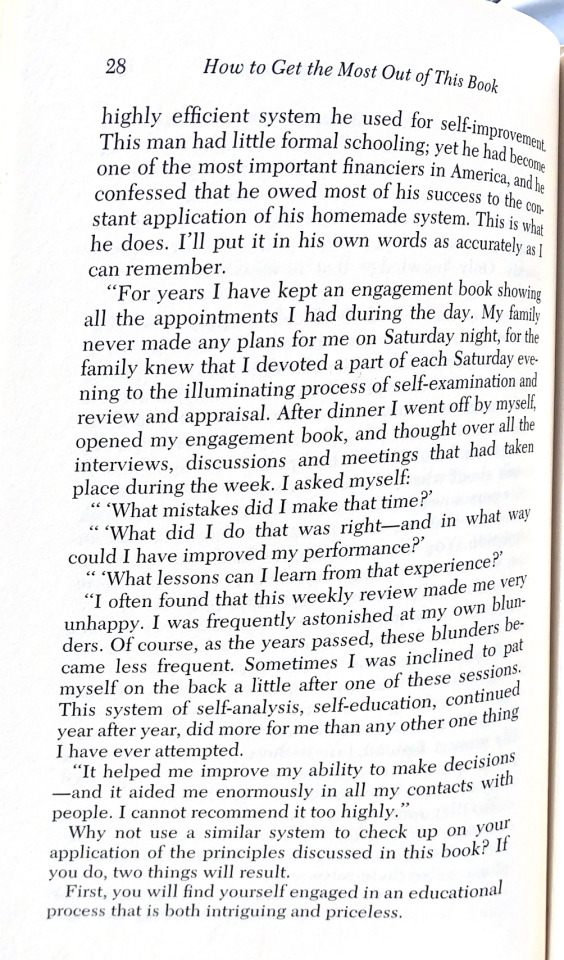
I ended up adapting these “Questions for Myself” into my work journal, to help me think about what I did well/not well each week.

I love thinking about this trait – whether or not someone likes people. It’s something I look for in interviews but I never thought to put it this way.
8 notes
·
View notes
Photo
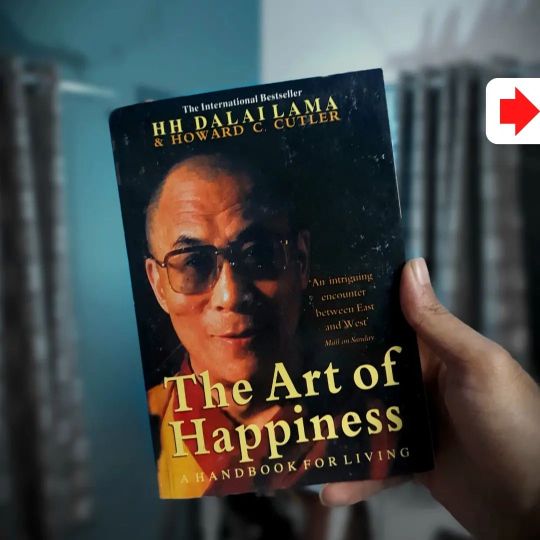
How to deal with feeling stuck, confused and exhausted? “When life becomes too complicated and you feel overwhelmed, it’s often useful just to stand back and remind yourself of your overall purpose, your ultimate goal. When faced with a feeling of stagnation and confusion, it is helpful to take an hour, an afternoon, or even several days to simply reflect on what it is that will truly bring you happiness and satisfaction, and then reset your priorities based on that. This will put your life back in proper context, allow a fresh perspective, and enable you to see which direction to take.” - Dalai Lama (Art OF Happiness) #selfhelpbooks #booksofig #nonfictionbooks #bestbooksever #bookwormlife #readingtime #bookhighlights #personaldevelopment #readersofinstagram #readreadread #mustread #books #indianbookstagrammer #readthisbook #bookaddict #indianbookstagrammer #indianbookblogger #bookstagramindia #selfhelpquotes #booknotes #bookhighlights #bookaddiction #bookrec #bookexcerpts #dalailama #newyearnewme #2023goals https://www.instagram.com/p/Clk3RAzPI_M/?igshid=NGJjMDIxMWI=
#selfhelpbooks#booksofig#nonfictionbooks#bestbooksever#bookwormlife#readingtime#bookhighlights#personaldevelopment#readersofinstagram#readreadread#mustread#books#indianbookstagrammer#readthisbook#bookaddict#indianbookblogger#bookstagramindia#selfhelpquotes#booknotes#bookaddiction#bookrec#bookexcerpts#dalailama#newyearnewme#2023goals
2 notes
·
View notes
Text
C-SPAN: Nadie Cohodas: Strom Thurmond Biography: The Politics of Southern Change (1993)
Source:The New Democrat
The best thing I can say about Senator Strom Thurmond, as someone who is not a fan, is that he was a reformed segregationist who reformed his views and rhetoric as the predominant views changed, even in South Carolina, especially as African-Americans became more prominent there. Or perhaps he changed his views because he believed he made mistakes in the past, but he…
View On WordPress
#103rd Congress#1993#America#BookNotes#Brian Lamb#C-SPAN#Christian Nationalism#Christian Nationalists#Dixiecrats#Far Right#Nadine Cohodas#Nationalism#Nationalists#Neo-Confederacy#Neo-Confederates#New Right#Populism#Populists#Senate Republicans#Senator Strom Thurmond#South Carolina#Strom Thurmond#The Politics of Southern Change#U.S. Congress#U.S. Senate#United States#Washington#Washington DC
0 notes
Text

"Jim, relax. Take a train ride. Howard."
I found this note when I used to scan and shelve books in Washington state. I found all kinds of cool notes and whatnot.
0 notes
Photo
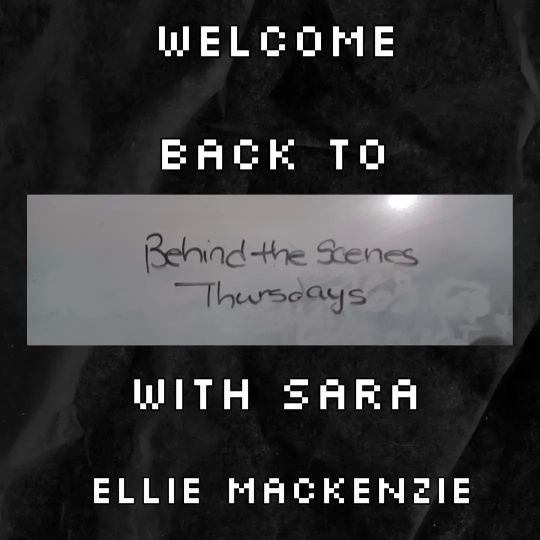
Welcome back to BEHIND THE SCENES! And yes, I almost forgot. 😂 Today is about my notes. I'll admit that I didn't want to originally keep them. When I began editing "Casting Shadows", though, I found myself using sticky notes. Fast forward to today and I'm meticulous! #BehindTheScenes #BookNotes #AuthorConfessions #CaffeineAndEditing #CheckYourNotes #TurnThePage #PrettyPens #BookSeries #DropMic https://www.instagram.com/p/Cftz7KVOvpW/?igshid=NGJjMDIxMWI=
#behindthescenes#booknotes#authorconfessions#caffeineandediting#checkyournotes#turnthepage#prettypens#bookseries#dropmic
0 notes
Photo

I've been reading this amazing book for a while and it took me a while to absorb the lessons of this book and complete it. 𝐈 𝐞𝐧𝐣𝐨𝐲 𝐫𝐞𝐚𝐝𝐢𝐧𝐠 𝐛𝐢𝐨𝐠𝐫𝐚𝐩𝐡𝐢𝐞𝐬 𝐛𝐞𝐜𝐚𝐮𝐬𝐞 𝐈 𝐰𝐚𝐧𝐭 𝐭𝐨 𝐤𝐧𝐨𝐰 𝐚𝐛𝐨𝐮𝐭 𝐩𝐞𝐨𝐩𝐥𝐞 𝐰𝐡𝐨 𝐦𝐞𝐬𝐬𝐞𝐝 𝐮𝐩 𝐭𝐡𝐞 𝐰𝐨𝐫𝐥𝐝. Priya Kumar's Shuttler's Flick is journey of Pullela Gopichand ; former badminton player, now coach of Saina Nehwal , P. V. Sindhu and many more. In this book, through the words of Priya, Pullela Gopichand is mentoring us to become a champion in one of his favorite game : LIFE According to Gopi Sir, badminton and life has many things in common. So through his badminton and life lessons, Gopi sir is going to teach us rules and lessons of life through the chapters. From childhood to fulfilling his dreams, Pullela shares about his journey, challenges, success & failures of his life. He entered a phase where he was at peak of his career but couldn't play further due to injuries cause in one of his game. Did he gave up? Nope, he bounced back and won the next championship he played proving 𝐒𝐮𝐜𝐜𝐞𝐬𝐬 𝐢𝐬 𝐭𝐡𝐞 𝐛𝐞𝐬𝐭 𝐫𝐞𝐩𝐥𝐲 𝐭𝐨 𝐧𝐚𝐲𝐬𝐚𝐲𝐞𝐫𝐬. Sometimes, when you are going through a rough phase feeling alone in the battlefield of life surrounded by problems from all side, you need someone as Krishna to Arjuna. This book is like Krishna, a guiding light when you feel lost in life. Through his own unique way, Priya Kumar put forth life of Gopi sir reflecting on all the confusing aspects that youngsters have like career vs family, If you love reading biographies or are looking for inspiration, finding it hard to stay up in against challenges, you should read Priya Kumar Shuttler's Flick. I'm sure you won't be the same person after reading this book. #dishawithbooks #shuttlersflick #akolabookblogger #autobiographies #bookstotreasure #booksbooksbooks #booknook #bookishcontent #booknerd #bookpost #booktok #bookish #bookblogger #bookreview #bookrecommendation #booknook #bookquotes #booknotes #learnings #bookinsights #quotesfrombooks #bookbookbook #booksbooks #priyakumar #bookstafeatures #bookstafamindia #indiareads #indianbookstagrammer #biographiesandmemoirs (at Shirpur) https://www.instagram.com/p/Cd8gAzIPp3h/?igshid=NGJjMDIxMWI=
#dishawithbooks#shuttlersflick#akolabookblogger#autobiographies#bookstotreasure#booksbooksbooks#booknook#bookishcontent#booknerd#bookpost#booktok#bookish#bookblogger#bookreview#bookrecommendation#bookquotes#booknotes#learnings#bookinsights#quotesfrombooks#bookbookbook#booksbooks#priyakumar#bookstafeatures#bookstafamindia#indiareads#indianbookstagrammer#biographiesandmemoirs
0 notes
Photo


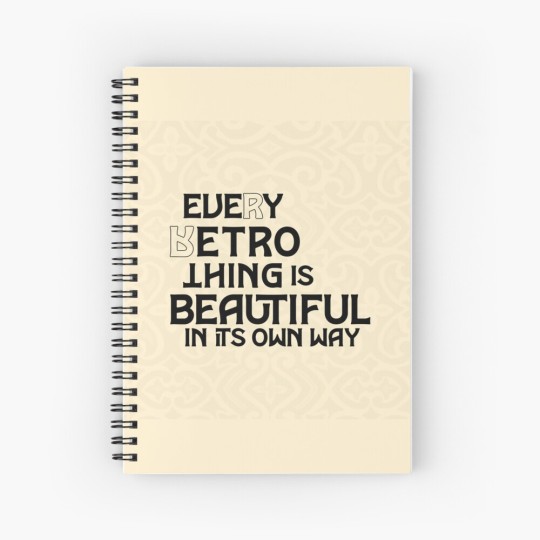





(via "Every Retro thing is beautiful in its own way." Throw Pillow for Sale by Muhzanoun)
#redbubble#etsy#amazon#retro#vintage#sale#sell#shopify#shopping#artists on tumblr#onlinebusiness#online store#usa#artsy aesthetic#quotes#text post#stickers#booknote#throw pillow#backpack#backpacking#wall art
1 note
·
View note
Text
Book Notes: In the Lives of Puppets

Those of you who have had the pleasure of coming to our bookstore in person may have noticed squares of cream-colored cardstock crammed full of scribbled writing, fluttering about on the shelves and attached to books via bright orange strings. These are our recommendation cards. When we love a book so much that we need everyone to know about it, we write a recommendation card. This is what happened when I finished Under the Whispering Door by TJ Klune, shortly followed by The House in the Cerulean Sea, both of which became two of my favorite reads from 2022. As his new book draws close to its release day (Tuesday, April 25), I knew I had to share what a delight it was with all of you.
In the Lives of Puppets is a futuristic Pinocchio retelling with robots. One of the things I love most about TJ Klune's adult novels is the eclectic mix of characters finding a home and a family in one another, characters who are real and quirky and heartfelt. In the Lives of Puppets is no different.
There is a house in the woods. In this house lives a family. An odd, pieced together sort of family, but a family nonetheless. Giovanni Lawson, inventor and android. Nurse Ratched, a caring nurse robot with a sadistic streak. Rambo, a small vacuum full of love and in need of attention. And Victor Lawson, Giovanni's human son. Their life in the woods is small, but good. Giovanni tinkers while Victor leads Nurse Ratched and Rambo on hunts through the Scrap Yards. It is on one of these hunts that they find HAP, an android in terrible condition. When Victor brings HAP home to be fixed up, he unknowingly kick-starts a chain of events that will dredge up Giovanni's dark past and lead to the destruction of their small world as he knows it. Populated with quirky characters and small kindnesses, this book left me itching to dive back into a reread.
With all of the important hallmarks of a proper Pinocchio retelling—the Blue Fairy, a circus (of sorts), a great big whale, and, of course, a wooden puppet—this book was both not what I was expecting and more. A warm hug in trying times, it is full of compassion, understanding, and forgiveness (while often being hilariously irreverent). In the Lives of Puppets comes out on April 25, 2023 and is available to preorder here. TJ Klune's other books are also available in paperback and are just as delightful. We will have copies of In the Lives of Puppets on its release day, and you can expect a recommendation card to show up shortly after. Happy reading!
—Becca
#island books#becca oman#tj klune#in the lives of puppets#under the whispering door#the house in the cerulean sea#pinocchio#booknotes
18 notes
·
View notes
Text
Book Notes: Nine Lies About Work
Nine Lies About Work, by Marcus Buckingham and Ashley Goodall
Lie #1: People care which company they work for
Truth: people care which team they’re on
8 Predictors of team performance:
I am really enthusiastic about the mission of my company.
At work, I clearly understand what is expected of me.
In my team, I am surrounded by people who share my values.
I have the chance to use my strengths every day at work.
My teammates have my back.
I know I will be recognized for excellent work.
I have great confidence in my company’s future.
In my work, I am always challenged to grow.
1/3/5/7 are “we predictors”
2/4/6/8 are “me predictors”
“What distinguishes the best team leaders… is their ability to meet these two categories of needs for the people on their teams.”
Lie #2: The best plan wins
Truth: The best intelligence wins
Liberate as much information as you possibly can.
Watch carefully to see which data your people find useful.
Trust your people to make sense of the data.
Plans are overly generalized and quickly obsolete. Coordinate your team in real time, relying on the intelligence of each team member.
This is an argument for weekly 1:1s. “Frequency trumps quality.” If you can’t do weekly 1:1s, you have too many people.
Lie #3: The best companies cascade goals
Truth: The best companies cascade meaning
In the real world, there is work. In the theory world, there are goals.
“Cascade meaning through our expressed values, rituals, and stories… We should let our people know what’s going on in the world, and which hill we’re trying to take, and then we should trust them to figure out how to make a contribution.”
Lie #4: The best people are well-rounded
Truth: The best people are spiky
See also: Lionel Messi’s left foot.
Competencies are impossible to measure.
Excellence is idiosyncratic.
Lie #5: People need feedback
Truth: People need attention
Ignoring a team led to 1:20 ratio of engaged:disengaged
Negative feedback (focus on fixing shortcomings) led to 2:1 ratio of engaged:disengaged (40x improvement to ignoring)
Positive feedback (attention toward what employees do best) led to 60:1 engaged:disengaged (30x improvement to negative feedback)
Feedback is a kind of attention
fMRI scans show that negative feedback triggers fight or flight and impairs learning.
Tell the person what you experienced when they had a moment of excellence. What you saw, and then:
How it made you feel, or
What it made you think, or
What it caused you to realize, or
How and where you will now rely on them
Lie #6: People can reliably rate other people
Truth: People can reliably rate their own experience
“Running out of 4s,” forcing the curve
In order to add precision to Potential and Performance, orgs create lists of competencies…
But it doesn’t work. Adding performance review training doesn’t help. 54% of variation in people’s scores can be explained by the personality of the rater (Idiosyncratic Rater Effect).
Recommendation: ask questions that produce data that are Reliable, Variable, and Valid. Good questions generate a bell curve of responses. Bias is inevitable so we’re best off framing questions around the rater’s personal experience of working with someone.
Four example questions: (⭐ ⭐ ⭐ ⭐ )
Do you always go to this team member when you need extraordinary results?
Do you choose to work with this team member as much as possible?
Would you promote this person today if you could?
Do you think this person has a performance problem that you need to address immediately?
Lie #7: People have potential
Truth: People have momentum
Truly people-maximizing exercise:
What’s your actual dream job, irrespective of company, industry, or line of work?
Find that job on LinkedIn. Look at the skills/experiences/qualifications listed. Figure out the gap. Make those skills/experiences/etc part of your current job.
Lie #8: Work-life balance matters most
Truth: Love-in-work is what matters most
List which parts of your work fall into “loved it” vs “loathed it”
Follow the red threads, weave them into your work. The “loved it” bits are your strengths.
Lie #9: Leadership is a thing
Truth: We follow spikes
The leaders we love don’t actually exhibit a list of leadership qualities.
You can’t practice the qualities (inspirational, visionary, strategic, good at execution, good at decision-making, innovation, executive presence, etc.) and thereby grow your leadership.
No two leaders create followers in the same way. We follow a leader because they are deep in something.
0 notes
Photo
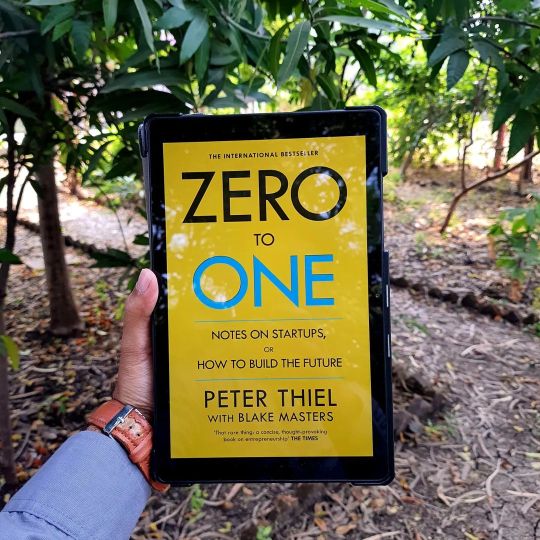
Zero To One By Peter Thiel . . . . . . . . . . . . . . . . . . . . . .. #booksofig #fictionbooks #bestbooksever #bookwormlife #readingtime #bookhighlights #readersofinstagram #readreadread #mustread #books #indianbookstagrammer #readthisbook #bookaddict #indianbookblogger #bookstagramindia #booknotes #bookhighlights #bookaddiction #bookrec #fictionbookstagram #zerotoone #peterthiel #businessideas #businesslessons #businessmantra #businesscoach https://www.instagram.com/p/Cm_xXTivmo_/?igshid=NGJjMDIxMWI=
#booksofig#fictionbooks#bestbooksever#bookwormlife#readingtime#bookhighlights#readersofinstagram#readreadread#mustread#books#indianbookstagrammer#readthisbook#bookaddict#indianbookblogger#bookstagramindia#booknotes#bookaddiction#bookrec#fictionbookstagram#zerotoone#peterthiel#businessideas#businesslessons#businessmantra#businesscoach
0 notes
Photo

#dibujos #drawing #pendrawing #pen #birome #feestyledrawing #house #hurrricane #sun #flowers # tree # bird #libretas #booknote https://www.instagram.com/p/Co6kCBpOat2/?igshid=NGJjMDIxMWI=
#dibujos#drawing#pendrawing#pen#birome#feestyledrawing#house#hurrricane#sun#flowers#libretas#booknote
0 notes
